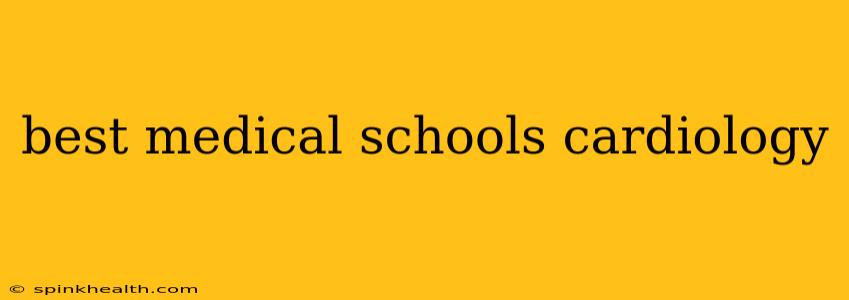Choosing a medical school is a monumental decision, a pivotal point in a journey filled with dedication, ambition, and a profound desire to heal. For aspiring cardiologists, the path is particularly demanding, requiring not only exceptional academic prowess but also a relentless passion for understanding the intricate workings of the human heart. This isn't just about memorizing textbooks; it's about nurturing a deep-seated empathy for patients and a commitment to pushing the boundaries of cardiovascular medicine. Let's explore what makes a medical school truly exceptional for aspiring cardiologists.
What Makes a Medical School Ideal for Cardiology?
The "best" medical school for cardiology isn't a single entity; it's a multifaceted concept. It's a blend of factors, each contributing to the holistic experience necessary to forge a successful cardiologist. Here are key considerations:
-
Strong Research Programs: Cardiology is a field constantly evolving. A top-tier program will offer robust research opportunities, allowing students to work alongside leading experts and contribute to groundbreaking discoveries. Look for schools with extensive funding, state-of-the-art facilities, and a vibrant research culture.
-
Renowned Faculty: Learning from the best is paramount. A strong faculty comprises experienced cardiologists who are not only accomplished clinicians but also exceptional educators, fostering a supportive and challenging learning environment.
-
Clinical Rotations and Exposure: Hands-on experience is crucial. A school with extensive affiliations with leading hospitals and healthcare systems provides ample opportunities for clinical rotations, allowing students to witness diverse cases and develop their clinical skills under the guidance of experts. Look for schools with strong ties to renowned cardiology centers.
-
Mentorship and Guidance: The transition from medical student to practicing cardiologist is demanding. A supportive environment with dedicated mentors who provide guidance and support is crucial. A school with a well-established mentorship program can make all the difference.
-
Cutting-Edge Technology and Facilities: Cardiology utilizes advanced technology. A top medical school will provide students access to state-of-the-art equipment and facilities, including sophisticated diagnostic tools and simulation labs, allowing them to hone their skills in a realistic setting.
How Do I Choose the Right Medical School for My Cardiology Aspirations?
Selecting the right medical school is a deeply personal process. Consider these factors:
- Your Research Interests: Do you have a particular area of cardiology that captivates you? Identify schools with faculty specializing in that niche.
- Location Preferences: Where do you envision yourself practicing? Choosing a school geographically close to your desired location can provide valuable networking opportunities.
- Program Size and Culture: Do you thrive in large, bustling environments or prefer a smaller, more intimate learning experience? Consider the school's size and its overall culture.
- Career Goals: Do you aspire to be a researcher, a clinician, or both? Tailor your choice to align with your broader professional goals.
People Also Ask:
What are the top medical schools for interventional cardiology?
Many top medical schools with strong cardiology programs offer exceptional training in interventional cardiology. However, the best choice will depend on your specific research interests and career goals. Look for schools with renowned interventional cardiologists on their faculty and strong affiliations with hospitals performing a high volume of interventional procedures.
Which medical schools have the best cardiovascular surgery programs?
While this question delves into cardiovascular surgery, rather than cardiology specifically, it's crucial to remember the close relationship between the two. Many top medical schools with esteemed cardiology departments also have equally robust cardiovascular surgery programs. Consider schools with a well-integrated cardiology and cardiothoracic surgery program, fostering collaboration and interdisciplinary learning.
What are the admission requirements for cardiology programs at top medical schools?
Admission to top medical schools is highly competitive. The requirements typically include a strong academic record, high MCAT scores, relevant research experience, compelling personal statements, and strong letters of recommendation. Standardized test scores and GPA are crucial, but demonstrating a passion for cardiology through research and clinical experience is equally important.
How important is research experience for getting into a top cardiology program?
Research experience is highly valued. It demonstrates your commitment to the field, your ability to conduct independent research, and your potential to contribute to advancements in cardiology. While it isn't always a strict requirement, demonstrating research experience significantly strengthens your application.
This journey to becoming a cardiologist is challenging yet deeply rewarding. By carefully considering these factors and aligning your choices with your passions and ambitions, you can pave the way for a successful and fulfilling career dedicated to the health of the heart. Remember, the best medical school is the one that best fits your unique needs and aspirations.

